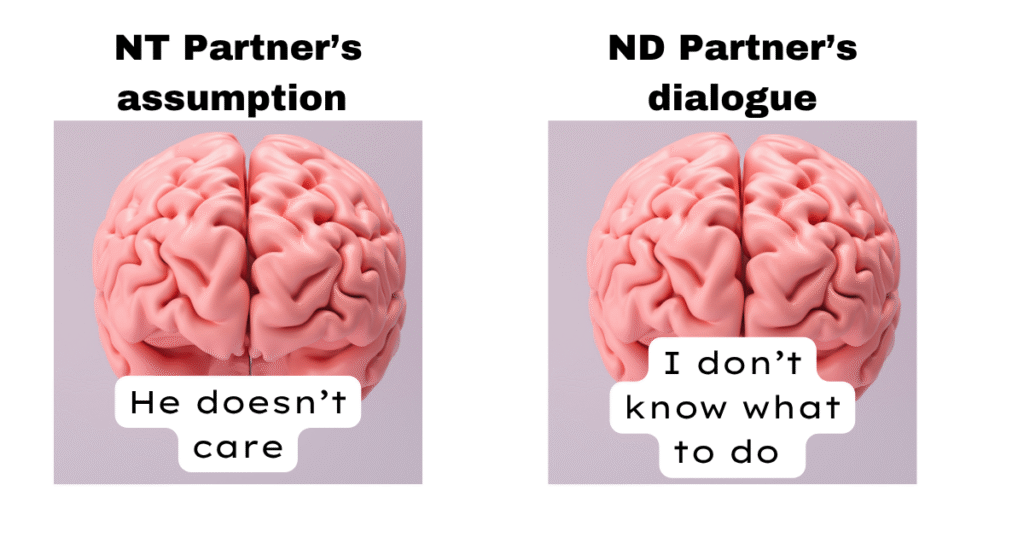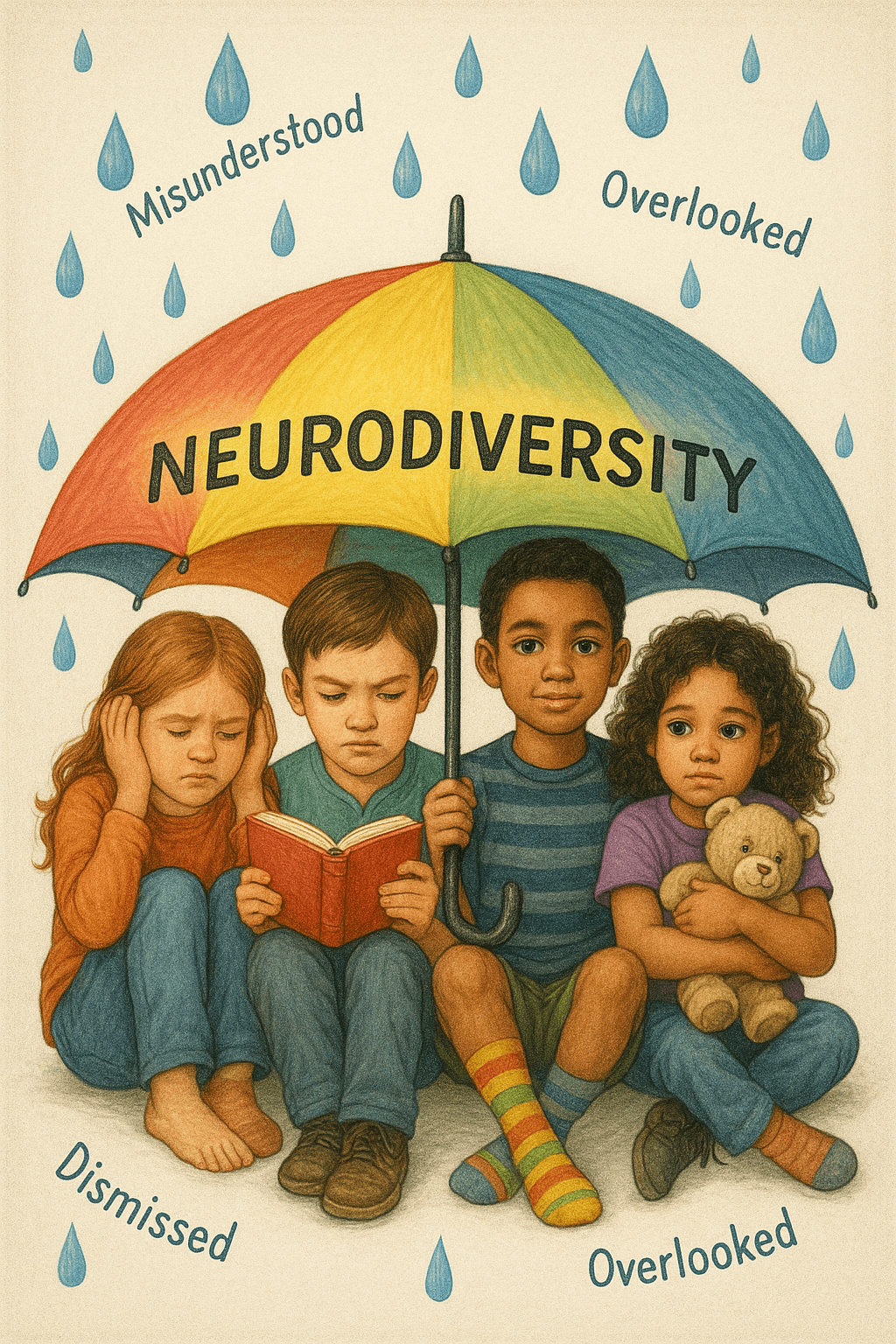Ever wondered why your neurodivergent partner just… sits there while you’re crying in the kitchen? Not a hug. Not a tissue. Not even a “Do you want a cuppa?” It’s not heartlessness. It’s not apathy. It’s brain wires doing the electric slide in a house with no lights on. Welcome to the often misunderstood world of ND relationships, where love is real but initiative is a no-show.
Executive Dysfunction: When Support Gets Stuck in Traffic
Imagine trying to leave the house, but your coat is in the dryer, your keys are under the cat, and your brain insists now is the moment to reorganise the spice rack alphabetically. Welcome to executive dysfunction, a hallmark of many neurodivergent profiles.
In relationships, this looks like:
- Knowing your partner is upset
- Wanting to help
- But being unable to translate thought into action
It’s not that the person won’t do the thing. It’s that their brain treats it like rocket science while everyone else thinks it’s a walk to the kettle.
Mindblindness: The Curse of the Unspoken Need
Neurotypical relationships run on unspoken expectations. A glance means “Hold me.” A sigh means “Offer help.” But for ND people, mindblindness (difficulty interpreting others’ thoughts and feelings) throws a wrench in the gears.
Your ND partner might see your sad face and think:
- Are they upset with me? Should I ask? Will that make it worse?
- They’re crying… do they want to be alone?
- If I go over and hug them and they’re not ready, will I be rejected?
Result? A frozen partner who looks uncaring but is actually trying not to make it worse.
Interoception: Emotional Clarity on Mute
Interoception is your body’s built-in signal system: hunger, stress, temperature, emotions. Many neurodivergent people have blunted or confused interoception, meaning they struggle to interpret not just their own emotions, but yours too.
You might be obviously overwhelmed. But their internal wiring might register it as:
- “Something’s up” (but not what)
- “This feels heavy” (but they don’t know how to act on it)
- “They’re clearly upset” (but also “how upset?” “why?” “is it time for intervention?”)
ND folks often feel deeply, but struggle to read or label what’s going on in the moment, especially under pressure.
Learned Helplessness: The Fear of Getting It Wrong
Many neurodivergent adults spent their childhoods being scolded for doing things “wrong”:
- Too loud
- Too blunt
- Too awkward
- Too much
By adulthood, this can turn into learned helplessness – a reluctance to act without explicit direction, for fear of rejection or failure.
So, when their partner looks distressed, their internal monologue might sound like:
- If they wanted my help, they’d ask.
- I’ve tried before and got it wrong.
- Better to say nothing than say the wrong thing again.
This fear isn’t laziness. It’s trauma with a tight-lipped smile.
Emotional Memory: When Context Doesn’t Connect
Neurotypical brains often link context and emotion automatically:
- It’s cold and she’s sniffling → get her a blanket
- He had a tough day → offer a back rub
But ND brains often keep categories separate: work, home, emotions, support, tasks. Without a clear bridge, the emotional cue doesn’t trigger the supportive behaviour.
That’s not a lack of care. It’s just that the mental filing cabinet didn’t cross-reference the moment.
Masking Burnout: No Energy Left for Empathy
ND people who mask all day, forcing eye contact, mimicking tone, faking interest in office small talk – often come home exhausted. That exhaustion doesn’t just hit their bodies. It blunts their capacity for empathy.
At the end of the day, even if their partner is silently weeping in a heap on the bed, their brain might not register “go comfort them”. It might register “shutdown imminent. Save self first.”
And that can look cold, even though it’s actually a survival tactic.
“Just Ask Me”: The Impossible Double Bind
Let’s talk about the Catch-22 of intimacy in ND relationships.
Partner says: “I want you to do it without me asking.”
ND person hears: “You’re supposed to read my mind or it doesn’t count.”
So they try to guess. They guess wrong.
Then they’re told: “You only did that because I told you.”
So they stop trying.
This isn’t a lack of initiative. It’s a relationship script written in a language they were never taught to read.
New Love vs Long-Term Love: The Hyperfocus Hangover
When ND people fall in love, they often fall hard. Cue hyperfocus – that all-consuming tunnel-vision state where the new partner becomes a full-blown Special Interest.
In the early stages of a relationship, this can look like:
- Constant messages
- Thoughtful gestures
- Overwhelming attention to your every like, need, and mood

And then… the fog lifts. Hyperfocus wanes. Not because the love is gone – but because the brain simply can’t maintain that intense level of dopamine-chasing for long.
Typically, hyperfocus lasts:
- A few weeks to a few months (varies by individual)
- Until routine kicks in or emotional safety is established
What comes next is often misread as “losing interest”. In reality, the ND partner is just returning to their baseline functioning, which might not include instinctive emotional check-ins or unprompted acts of service.
This shift can feel jarring for their partner, especially if they’re neurotypical. Suddenly, the person who was texting sweet nothings daily is now forgetting anniversaries and asking if “we’re still doing the dinner thing”.
But this isn’t detachment. It’s the brain exhaling. The love is still there, it’s just not being managed by adrenaline anymore.
If both partners understand this arc, it can help soften the disappointment and create space for more sustainable, realistic ways to show care.
“Just because the hyperfocus fades doesn’t mean the love fades. It means the brain is no longer running on romantic rocket fuel.”
What Helps? (It’s Not Mind-Reading Practice)
1. Turn expectations into agreements
Set actual plans. Try:
“If I’m quiet for more than 10 minutes when we’re home, please check in.”
Clear beats clever.
2. Use codewords or visual cues
Create gentle shortcuts like:
“Code Green” = I’m fine, just quiet.
“Code Amber” = I need some love but can’t say it aloud.
It’s not childish. It’s bloody clever.
3. Accept scripts and prompts
Repetition builds fluency. If “Do you want to talk or just be held?” becomes a go-to, eventually it stops feeling robotic.
4. Reframe love away from spontaneity
Some love languages are silent. In ND relationships, love might look like:
- Restocking your favourite cereal without fanfare
- Sending you a weird meme as a “thinking of you”
- Standing near you quietly while you cry
Just because it’s not flowers and poetry doesn’t mean it’s not devotion.
5. Stop comparing to ‘normal’
Forget what support “should” look like. Notice what it does look like. Then build your own rules, together.
TL;DR? (Too long;didn’t read)
Neurodivergent people are not emotionally vacant.
They are emotionally overwhelmed.
They don’t lack empathy.
They often lack access to the tools of timely expression.
So the next time your partner doesn’t do the thing ……pause.
It might not be absence of care.
It might be the silence between thought and action, amplified by years of fear, confusion, and burnout.
What do you wish your partner understood about your love language—or vice versa?




